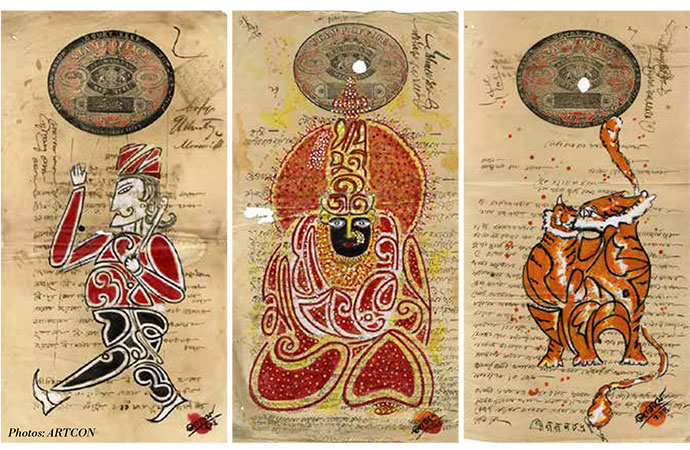Column

There is a teenage girl named Sonali. More about her later. More about me first.
I am 67. Time is almost done with me but I am not yet done with myself. Therein lies my predicament. Too old to dream but too young to die, people like me live in suspended grace between gravitational age and redemptive imagination. We are the human equivalent of geriatric houses that the municipal authorities have declared to be structurally unsafe but which refuse to collapse, here and now.
Those houses will be demolished one day to make way for serried high-rise flats. Unknown people will come to live in them. Neighbouring houses will look anxiously around, wondering how soon their turn for extinction will come. Soon, new concrete structures and their inhabitants will forget that an old house ever existed in their midst. That unwanted house will go from being body to soul. The soul is eternal but it is nothing without a body. The soul of a departed house has no body.
Kolkata boasts many bonedi, or aristocratic, houses that once belonged to zamindars or to professionals who rose to administrative, judicial or commercial prominence in the Raj. Rai Bahadur is a familiar name found on the marble name plates of bonedi addresses. Several such houses have descended into arthritic disrepair. Also, their old inhabitants have died, and their latest descendants have moved on to new lives in the rest of the country or abroad, perhaps never to return. Pragmatically, it makes little sense to hold on to a potentially valuable piece of real estate that is increasingly expensive to maintain in its current form. Therefore, there will come a time in which to let go of the past.
Recently, I stumbled upon a building in south Kolkata that had been declared to be unsafe. Although a few people still lived there, the house appeared to have accepted its condemned status. Guard railings on its second-floor balcony were broken, the first floor was abandoned, a scooter was parked incongruously on the street in front, and life went on around the building as if it had never existed.
That building was me. I was its human incarnation. Decrepitude defined both of us. Both of us had been young once. Now, both of us were vacating our space in time to make way for others' time in space.
Sonali
But, as I walked along the street lying opposite the house, there stood Sonali. A small and thin girl with large eyes and an infectious smile, she is a Class VIII student in a nearby school. I asked her whether she writes essays. What? Do you pen "compositions"? What? Rachana lekho? Same questions but now in a common mother-tongue. Yes, she replied. So, I said, why do you not write about the house that you look at every day? What should I write about the house, she asked. Write about how it resembles me, I said. She was bewildered and fell silent. I walked away.
I saw Sonali again two days later. Recognition flit across her face like a prodigal smile. How are you, she asked. Not well, I replied. I added: So take me home. She laughed and led me to the cranny in which she lived. Sonali ran ahead of me, skipping through the air as she mimicked invisible patterns made by imaginary ropes circling over and under her. Adults walk: Children run. In fact, they dance their way into everything. An adult who manages to keep pace with them extends the duration of his mortality by happiness measured in moments. As the departing house watched, I caught up with Sonali. The house was envious. Unlike me, it could not run.
There was an aunt at home. She had no idea of who this genial intruder was. I introduced myself and presented Sonali with a copy of my book, Sohag Chand: Homage to Bengal, published by Cosmos Books. My book is a rachana, a composition, an essay by an old house-turned-man. The house is Parar Dadu: I am Durer Dadu. The house is an honorary grandpa who lives across the street: I am an honorary grandpa who lives many streets and lands away in Singapore. But both the house and I are dadu.
So, I am now in a relationship. I am related to a house not my own, and the house is related to me, a stranger. That stranger found a little girl, the little girl took him home, and the stranger became a little less strange because of a book he had written.
The house, the impromptu manager of this improbable relationship, may be pulled down one day. I know that I shall die sooner or later than that. But I know also that Sonali will grow up to remember both the house and me.
A house and a man that have passed by, the man fitfully and the house resoundingly, both will have a place in the continuity of Sonali's life.
Long after the house and I have gone, I hope that Sonali will sing that hauntingly gentle Tagore song, "Esho amar ghore esho, amar ghore". "Bahir hoye esho tumi je aacho ontorey": Come home to me. Appear to me, you who have lived in my heart unseen. Let me meet you. Let me bring you home. Come.
I shall come.
The writer is Principal Research Fellow of the Cosmos Foundation. He may be reached at epaaropaar@gmail.com

























Leave a Comment
Recent Posts
Pedaling Through the Mangroves ...
The journey from the bustling streets of Barishal to the serene, emera ...
Why the Interim Government mus ...
Two weeks out from what is expected to be a red letter day in the figh ...
Doesn’t matter who thinks what about Bangladesh deci ..
The Other Lenin
US President Donald Trump said his administration
Govt moves to merge BIDA, BEZA, BEPZA, MIDA